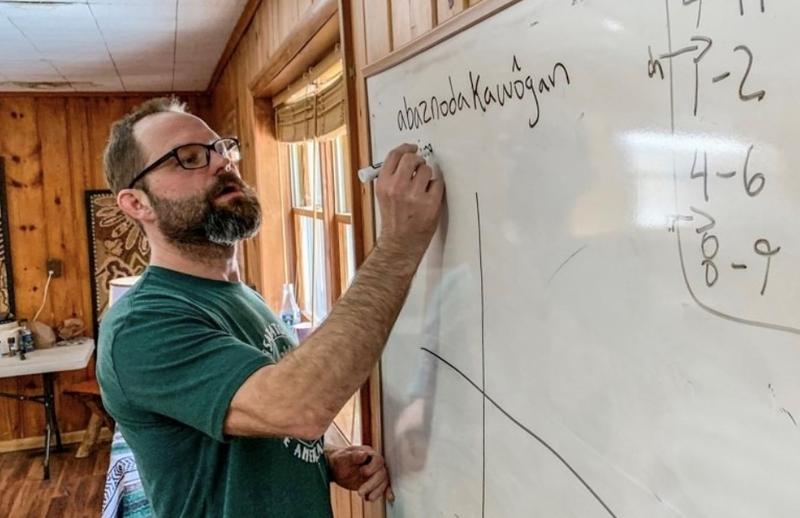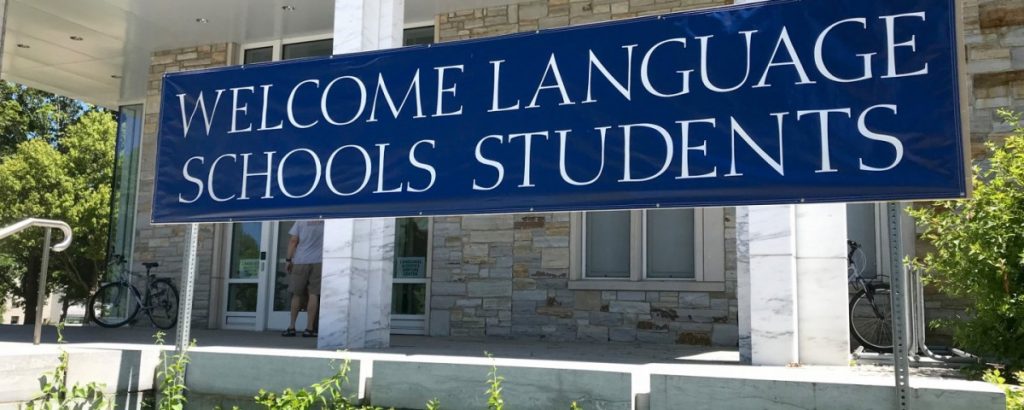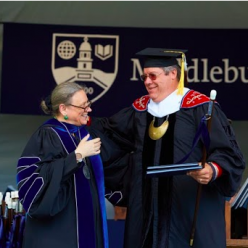In January 2020, Middlebury College announced a pilot Abenaki Language School. Middlebury College President Laurie Patton said about the program, “We want to recognize and honor the people on whose land Middlebury is making its home” (“Middlebury Launches”). The program aimed to help preserve the extremely endangered language of Western Abenaki. Western Abenaki is an Algonquin language, whose range is centered around the Lake Champlain area and the land that Middlebury College occupies. Years of genocide, colonization, boarding schools, and assimilation policies nearly destroyed the Abenaki language (Bruchac 11). Thanks to a few fluent speakers carrying the language forward, it has survived until today, and several programs are working to preserve and revitalize the language.
Middlebury College has a history of highly successful summer language schools for almost a dozen languages, from Arabic to French, to Spanish to Japanese and more. These immersive programs take place at the college during summer, and are open to all ages and competencies. Like the other language schools, students in the Abenaki school were required to take a Language Pledge, to only speak in the taught language when at the school. They also planned to immerse the students in cultural events, including basket making. However, while a typical language school teaches for 7-8 weeks, the Abenaki program only lasted two weeks, as the program in 2020 was only a pilot version. The program planned to have approximately twenty students. Unlike the other language schools, which often cost thousands of dollars to attend, the pilot Abenaki school was offered free of charge.

Jesse Bowman Bruchac, one of the most notable figures in the fight to preserve the Western Abenaki language, helped develop and eventually direct the program. Bruchac, who is Nulhegan Abenaki, is one of the few fluent speakers of Western Abenaki left, and much of his work has focused on preserving the language and making it accessible to new learners. He has created a website, westernabenaki.com, with free audio and video lessons made by him and other speakers of the language. The website also has an affiliated YouTube channel and Facebook page. Bruchac has lectured at Yale, Harvard, Princeton, and Dartmouth (“Middlebury Launches”). He currently teaches a Western Abenaki language course at the University of Southern Maine with linguist Dr. Conn Quinn. He has written several bilingual books in English and Western Abenaki.
Bruchac’s involvement with Middlebury college preceded his work in the pilot Abenaki Language school. In 2019, he performed the flute and gave an invocation with Chief Don Stevens at Middlebury’s commencement ceremony. Patton was inspired by the performance and invocation, and began to consider the possibility of an Abenaki Language School (Kapp). Bruchac worked with Patton in the fall of 2019 to develop the program. After its announcement in January 2020, applications quickly filled up (Kapp). With so many applicants, they selected the strongest speakers to test out the pilot program.
Due to the COVID-19 pandemic, the Abenaki Language School had to alter its programming to an online, remote setting. Twenty three students were accepted into the program. Twenty were registered members of Abenaki tribes, and all twenty three had some former experience with the language. The ages of students ranged from as young as eighteen, to as old as seventy five. They met for six hours a day, during three two hour sessions, for two weeks from June 30 to July 14. Jesse Bruchac and Dr. Conn Quinn of the University of Southern Maine taught the course in tandem. Kerry and Aaron Wood (Nulhegan Abenaki) also taught a basket making workshop in Western Abenaki. The course culminated in a live-streamed presentation at the end of the session, where the students shared personal works in Western Abenaki. The course is planned to run again next summer in 2021, although it has not yet been confirmed if it will be free of charge again. While preference will be given to applicants who are Abenaki, the program is open to all.

Continued Reading
Western Abenaki History and Revitalization
Bibliography
“Abenaki.” Middlebury Language Schools, Middlebury College, 24 Nov. 2020, www.middlebury.edu/language-schools/languages/abenaki.
Bruchac, Joseph. “Joseph Elie Joubert: Language Keeper.” Voices: The Journal of New York Folklore, vol. 45, no. 1/2, Spring/Summer 2019, pp. 11–12.
Jesse Bowman Bruchac. http://jbruchac.com/. Accessed 22 Apr. 2021.
Kapp, Caroline. “School of Abenaki Joins Language Schools As a Pilot Program.” The Middlebury Campus, Middlebury College, middleburycampus.com/47957/news/school-of-abenaki-joins-language-schools-as-a-pilot-program/
McLaughlin, Catherine. “School of Abenaki Pilots First Summer Remotely.” The Middlebury Campus, https://middleburycampus.com/52123/news/school-of-abenaki-pilots-first-summer-remotely/. Accessed 22 Apr. 2021.
“Middlebury Launches Pilot Abenaki Language School.” Middlebury, Middlebury College.10 Jan. 2020, http://www.middlebury.edu/newsroom/archive/2020-news/node/642425.
Reed, Elodie, and Jane Lindholm. “’Kwawaldam?’: Middlebury Language Schools To Offer Abenaki Pilot Program.” Vermont Public Radio, Vermont Public Radio, www.vpr.org/post/kwawaldam-middlebury-language-schools-offer-abenaki-pilot-program#stream/0. Accessed 22 Apr. 2021.Western Abenaki Dictionary and Online Lessons: Home of the Abenaki Language. http://westernabenaki.com/. Accessed 22 Apr. 2021.
